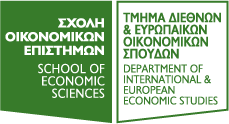Fall Semester 2021-2022
-
Date:20/09/2021 - 15:30 to 17:00

September 20, 2021
Title: The Response of Local Corporate Sustainability to Environmental Disasters: Evidence from Wildfires/WEBINAR
Speaker: Ioannis Branikas, Assistant Professor of Finance, University of Oregon
Time: 15:30-17:00
Host: Professor Evangelos Vassilatos, Department of Economics, Athens University of Economics and Business
Abstract: Environmental disasters are thought to increase the focus on corporate sustainability in the communities where they occur. Extracting data on wildfires (a frequent type of disaster in the U.S.), and using two ESG rating agencies and EPA air enforcement actions to construct measures of local corporate sustainability, we study this conjecture. To address the omitted variables concern, we conduct a pre- and post-trends analysis as well as an instrumental variables analysis using the Hot Dry-Windy Index of Srock, Charney, Potter, and Goodrick (2018). We show that severe wildfires in a county increase significantly its corporate environmental sustainability in the following year. The impact is not homogeneous across counties: it is significant only in counties where the percentage of anthropogenic climate change believers is high, or where the majority of voters are Democrats.
-
Date:04/10/2021 - 15:30 to 17:00

October 4, 2021
Title: Market Structure, International Banking, and New Technology: Evidence from the Loan Markets of the European Union
Speaker: Małgorzata Pawłowska, Warsaw School of Economics
Host: Georgios Kouretas, Department of Business Administration, Athens University of Economics and Business
Time: 15.30-17.00
Attachments:
 PDF of Relevant Paper
PDF of Relevant PaperAbstract: The aim of this paper is to investigate whether the market structure and new technology have an impact on bank loan markets in the European Union. The impact of new technology on three types of bank loans (residential mortgage loans, consumer loans, and corporate loans) is quantified separately at the bank level, using the single-equation panel regression model and the interacted panel vector autoregression model. Using a panel data sample for the period 2004–2019, we find that new technology mainly affects the growth of loans for households, in particular, for consumer loans. We also find some heterogeneities between advanced and transitioning European Union banking sectors. Furthermore, the impact of new technology is significantly stronger and prolonged for foreign banks. Finally, our findings confirm the leading role of loans for households in the use of new digital technologies.
-
Date:14/10/2021 - 15:30 to 17:00

Οctober 14, 2021
Title: The Unintended Consequences of Meritocratic Government Hiring
Speaker: Assistant Professor of Economics Ioannis Κospentaris, School of Business, Virginia Commonwealth University
Host: Professor Evangelos Vassilatos, Department of Economics, Athens University of Economics and Business
Time: 15.30-17.00
Abstract: In an attempt to mitigate the negative effects of clientelism, many governments around the world have adopted meritocratic hiring of public employees. This paper shows that meritocratic government hiring can have unintended negative consequences on macroeconomic aggregates. In many countries, public employees enjoy considerable job security and generous compensation schemes; as a result, many talented workers choose to work for the public sector, which deprives the private sector of productive potential employees. This, in turn, reduces firms’ incentives to create jobs, increases unemployment, and lowers GDP. To quantify the effects of this novel channel, we extend the standard Diamond-Mortensen-Pissarides model to incorporate workers of heterogeneous productivity and a government that fills public sector jobs based on merit. We calibrate the model to aggregate data from Greece and perform a series of counterfactual exercises. We find that the adverse effects of our mechanism on TFP, GDP, and unemployment are sizable.
-
Date:29/10/2021 - 16:30 to 18:00
 Οctober 29, 2021
Οctober 29, 2021Title: Optimal Monetary Policy with and without Debt
Speaker: Professor Rigas Oikonomou, Université Catholique de Louvain
Host: Assistant Professor Evangelos Dioikitopoulos, Department of Economics, Athens University of Economics and Business
Time: 16.30-18.00
Room: A36
Abstact: We propose a novel framework of optimal monetary policy in the case where debt sustainability may be a constraint for the central bank. We assume that a monetary authority solves a Ramsey problem under commitment, subject to a set of relevant competitive equilibrium constraints. Depending on the specification of fiscal policy, the constraint set may include the 'consolidated budget constraint'. In particular, if fiscal policy does not generate sufficient surpluses to finance debt then optimal monetary policy must ensure debt sustainability and needs to take into account the constraint. In contrast, if fiscal policy can finance debt through taxes, then the debt constraint is not relevant for monetary policy. We derive optimal interest rate rules in these two cases. Translating the Ramsey outcome into the fiscal theory of the price level framework, we show analytically that when the central bank has to take debt into account optimal policy is a standard 'passive money' rule (e.g. Leeper (1991)).In contrast, when the debt constraint is not relevant for the central bank, optimal monetary policy is 'active'. We then characterise analytically key forces behind optimal policy, exploring the role played by key model variables such as debt maturity and identifying the various channels through which optimal policy responds to shocks. We also explore whether the debt constraint implies significant exposure of inflation to fiscal shocks, when monetary policy is optimal. Finally, we consider several extensions of our framework, including a medium scale DSGE model, and a model with 'regime fluctuations' where the monetary authority may temporarily have to account for debt.
-
Date:25/11/2021 - 15:30 to 17:00

November 25, 2021
Title: Climate Change Financial Risks, Implications for Asset Pricing and Interest Rates
Speaker: Dr. Christos Karydas, Center of Economic Research at ETH Zürich
Host: Professor Evangelos Vassilatos, Department of Economics, Athens University of Economics and Business
Time: 15.30-17.00
Attachments:
 PDF of Relevant Paper
PDF of Relevant PaperAbstact: In addition to rare macroeconomic disasters (e.g. wars, financial crises and pandemics), climate change poses a threat to financial stability - with extreme climatic events increasing in frequency and intensity and political risks putting pressure on asset valuations. To study the effect of a changing climate on asset prices and interest rates we include both sources of rare disasters in a dynamic CAPM with time-(and stochastically-) varying risk and recursive preferences. A changing climate makes former tail events more frequent and less predictable, increasing the premium of climate risk; interestingly, this change may not be fully reflected on the overall market risk premium that holds both components of risk: macroeconomic and environmental. The same is not true for interest rates, the return on sovereign debt and the participation of climate-risky assets in the market portfolio, that are expected to decline unambiguously as the planet warms.
-
Date:02/12/2021 - 15:30 to 17:00

December 02, 2021
Title: Voting in shareholders meetings
Speaker: Aniol Llorente-Saguer, Professor in Economics at Queen Mary University of London
Host: Assistant Professor Evangelos Dioikitopoulos, Department of Economics, Athens University of Economics and Business
Time: 15.30-17.00
Room: A36
Attachments:
 PDF of Relevant Paper
PDF of Relevant PaperAbstract: This paper studies voting in shareholders meetings. We focus on the informational efficiency of different voting mechanisms, taking into account that they affect both management’s incentives before the meeting and shareholders’ decisions at the meeting. We first deal with the case in which the management does not affect the proposal being voted on. We show that, for any distribution of shareholdings and any informational asymmetry among shareholders, a voting mechanism with a richer ballot space dominates a voting mechanism with a poorer one. We then show that efficiency requires full divisibility of the votes. Second, we consider the case in which the management decides whether to put the proposal to a vote. The properties of a voting mechanism then depend both on its voting efficiency and on how it affects managers’ incentives to select good proposals. We uncover a trade-off between selection and voting efficiency underlying the comparison of voting mechanisms: the higher voting efficiency of mechanisms with richer ballot space implies worse selection incentives. In some cases, the negative effect of worse selection incentives on shareholders’ welfare can be large enough to wash out the higher voting efficiency of even the most efficient mechanism.
-
Date:06/12/2021 - 15:30 to 17:00

December 06, 2021
Title: Near‐money in history: Cryptocurrencies versus bills of exchange
Speaker: Assistant Professor Nektarios Aslanidis, Universitat Rovira i Virgili and ECO‐SOS
Host: Professor Evangelos Vassilatos, Department of Economics, Athens University of Economics and Business
Time: 15.30-17.00
Abstract: The expansive growth of cryptocurrencies has challenged the standard definition of “money” as legal tender issued by the central authority. Decentralized blockchain technology has spread the use of cryptocurrencies despite their lack of legal status as “money”. However, decentralized near‐monies are not a new phenomenon in history. This research analyses the economic and econometric features of cryptocurrencies in the era of the Digital Revolution in comparison with a crucial decentralized near-money in history: bills of exchange at the peak of the Commercial Revolution. We examine the features of near‐monies in order to re‐conceptualize the meaning of “money” beyond the current standard definition. From an economic point of view, we focus on the functions of money in theory, that is, near-monies as a medium of exchange and as a store of value. In consequence, we adopt the Diebold‐Yilmaz econometric approach to measure the economic spillovers between near‐monies and financial assets, hard currencies, and commodities with the aim to test empirically the functions of near‐monies. We believe a re‐conceptualization of the meaning of “near‐monies” in history can inspire policymakers nowadays to grapple with regulation.





